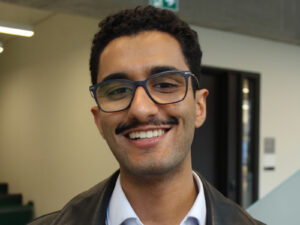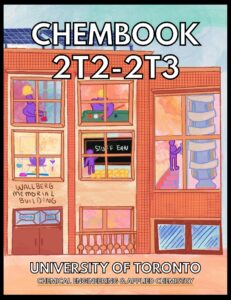
Why did you choose to study chemical engineering at U of T?
I came for the program. I stayed for the people. I decided to study chemical engineering to address what I believe is my generation’s defining challenge: climate change. The technical aspects of the ChemE program at U of T – such as the unique lab spaces and rigorous academics – seemed like a great foundation for that goal.
However, after nearly 4 years in the program, I find myself most grateful for the people I’ve met and worked with. From professors who are world renowned experts and passionate educators, to TAs who bring so much dedication and insight, to classmates I’m honoured to call my peers and friends, my time here has been all about the incredible experiences I’ve shared with everyone in the engineering community.
Tell me a bit about your university experience so far and any extracurricular activities you participate in.
My experience at U of T Engineering has been spectacular so far, and extracurriculars have played an enormous role in my personal and professional development.
The core focus of my extracurricular efforts has been to improve students’ academic experience. Engineering is by no means easy, but I believe that every student can excel when offered the right support. The journey began with a research project with Prof. Jennifer Farmer, where I developed inquiry-based home labs for first year students. Next year, I transitioned from curriculum development to direct instruction as a teaching assistant for first year calculus. I taught three classes a week, using my experience being fresh out of first year to support students in the classroom. More recently, I founded the Academic Success & Support Committee within Chem Club. We are a group of passionate upper year CHE students who, for two years and counting, have hosted “for students by students” exam reviews spanning 6 courses, reaching over 650 students to date. Through these experiences I have gained a better understanding of students’ needs and improved my leadership and communication skills. I continue to advocate for student interests through my elected and appointed roles in the faculty governance structure.
Of course, school isn’t all about academics. Some of my favourite experiences stem from extracurriculars like F!rosh Week, where I have volunteered for 3 years, most recently leading a group of ~35 volunteers and 50 first year students through the fantastic student-run programming of orientation week. I am also involved with Engineers Without Borders, recently serving as External Director. Last year, I co-produced the annual Chembook (ChemE yearbook), and I keep a copy of it on display in my room as a reminder of the great community we have in ChemE.

Why did you choose to do PEY Co-op? What were your expectations before starting your placement?
Something that sets engineering apart from science is the focus on deploying solutions at scale to improve human life. I chose to do PEY co-op because I wanted a chance to apply my knowledge to real-world problems before graduation. In addition, I felt that having a year of exposure to industry would provide me with a better perspective heading into my final year.
What is the name of your employer? What is your position title?
I work at Husky Technologies as a Development Designer on the Sustainability and Polymer Science team, supporting Research and Development (R&D) activities. Husky is a world leading supplier of injection molding equipment and services, offering sustainable packaging solutions to the food and beverage, consumer goods, and medical markets.
Is your placement meeting your expectations so far?
My placement is exceeding my expectations. I have learned an incredible amount – not only about our industry, but also about the many industries upstream and downstream of ours. My role involves research, design, and testing, which allows me to expand on the technical skills and theory I learned in school. For example, I regularly draw on concepts from first-year materials science (crystallization and polymer phase behaviour), second year organic chemistry (polymer formation and degradation processes) and transport phenomena (heat and mass transfer requirements for polymer conditioning). It is a pleasure to have a role that rewards curiosity and analysis.
My role has also exposed me to the legislative side of the plastics industry. My team keeps track of global plastics legislation to identify trends and opportunities in recycling and waste management.
What does a typical day look like for you?
I begin every day by reviewing my to-do list, creating a plan, and catching up on emails. On most days, I work in the office, conducting research, designing tests, analyzing data, and attending meetings. On other days, I conduct tests as part of our research projects. These range in complexity from taking measurements independently in the lab to working in a team to operate industrial equipment, collect data, and troubleshoot on the fly.
I have also become something of a celebrity at Husky due to my lunch activities – I am on a mission to have lunch with as many people as possible and share my “lunch learnings” on the company’s internal social media, similar to Dean Yip’s #CoffeeWithChris for those familiar!
What challenges have you encountered during your placement and how have you navigated them?
They say that experience is the best teacher, and I have learned a lot from the challenges I have faced at work. R&D roles like mine require vast industry knowledge in order to evaluate which innovations are more likely to be impactful. As a newcomer to the plastics processing industry, I had many ideas but lacked the context to evaluate them on my own. To overcome this, it is essential for me to interact with different teams to understand the current state of the art, the pain points, and the types of improvements that would make a real difference. This process has accelerated my learning and given me valuable experience in cross-functional communication.
What opportunities and projects have your placement exposed you to?
My role has exposed me to several interesting projects and new responsibilities. On the technical side, in one of my favourite projects, I am leading validation efforts for a device sold by a third-party vendor. This is an important duty, and I am responsible for communicating with external partners, designing tests, and analyzing data while abiding by our confidentiality agreements. This project has challenged me to analyze unexpected results and implement concrete changes to improve the quality and quantity of data in subsequent tests.
Other projects have me working with other business units to advance Husky’s strategic sustainability initiatives. I have presented my work in this area directly to senior leadership, which was a great experience. I learned how to align my work with the company’s strategy and craft my communications for a busy executive audience.
What have you learned from your placement that will help you during your last year in ChemE and beyond?
One skill I am taking away from my role is the ability to start with a problem, sometimes a vaguely defined one, and break it down into manageable pieces. Whether in school or industry, the process of questioning your assumptions, identifying resources, coming up with solutions, and analyzing your results is never easy. The opportunity to practice these skills every day with seasoned professionals and on real projects with real outcomes has been extremely valuable to me, and I am looking forward to being back in the classroom with a refined skillset.
What industry would you like to work in after graduation?
I am interested in several industries. I could explore my interests in waste management and valorization in the water treatment or recycling sectors. I also see myself working in polymers or energy.
Where would you like to be in five years after graduation?
These questions are always tough to answer. Five years ago, I could not have imagined the journey that lay ahead of me. I hope that the next five years bring as much growth, connection, and learning as the last five, no matter what path I take.
What are you great at?
I am great at connecting with people to create and work towards a common vision. Historically, I had considered myself a shy person, but my time at U of T Engineering helped me get out of my comfort zone. I try to engage with as many people as possible in order to learn, share passions, and create memories. When you meet someone who is passionate about their work, you can’t help but be inspired. This kind of infectious energy is exactly what I seek out and try to create with my teams, and it has pushed me to develop myself as an engineer and leader.